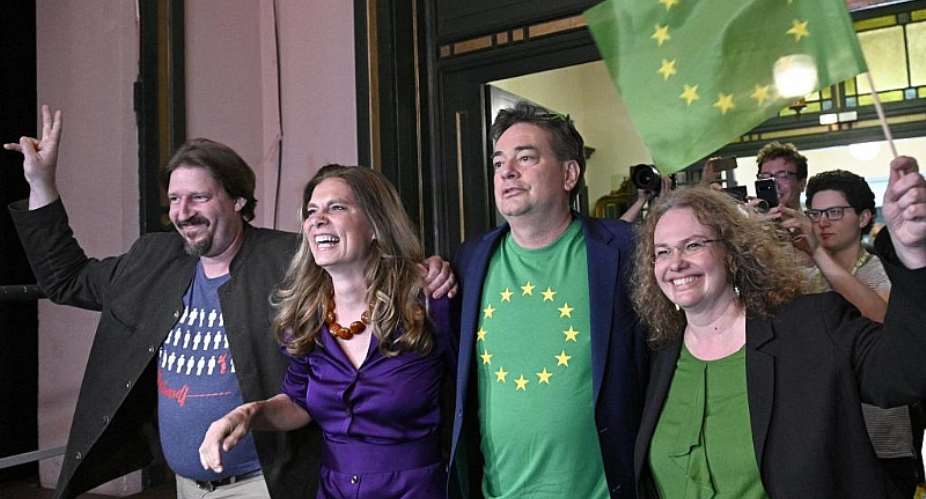With a double-digit score across Europe's biggest countries – including a stunning 20 percent in Germany – the Greens have made record gains in European Parliament elections with younger voters leading calls for action to halt global warming.
In France, the Greens was set to win 12-12.7 percent of the EU vote, up from 8.9 percent in 2014. Likewise in Austria, Ireland and the Netherlands, the environmental party were on course to garner more than 10 percent.
With the two main traditional EU blocs -- the conservative EPP and the centre left Social Democrats projected to lose ground, the Greens could end up as kingmaker in the European Parliament.
"This is a Sunday for Future," said the Greens' lead candidate in Germany Sven Giegold, in a nod to the "Fridays for Future" school strikes by students sounding the alarm on the climate crisis.
His counterpart in France, Yannick Jadot, also hailed it as a "green wave in which we are the main players."
France's Prime Minister Edouard Philippe acknowledged the "message about the ecologic emergency".
"Everywhere in Europe, our citizens and in particular the youngest are asking us to act with determination and that's what we'll do in France and in Europe," he said.
'Prove you mean business'
The momentum for the Green surge had been building up over months as the strikes started last November by Swedish activist Greta Thunberg, 16, not only refused to lose steam but caught the imagination of youth across the world.
In a major mobilisation on Friday, tens of thousands of students rallied, with some calling on their parents to tick the box for the environment at European polls this week.
Cheering Sunday's results, a leading student activist in Germany Luisa Neubauer wrote: "The European elections show that we're not only bringing the climate crisis to the streets but also to the ballot boxes. This should give food for thought to those who have in the last month laughed at 'youth engagement'."
Under the 2015 Paris deal to limit global warming to well below two degrees Celsius above pre-industrial levels, the 28-nation EU has pledged to cut greenhouse gas emissions by at least 40 percent by 2030, compared to 1990.
But many scientists and climate activists say Europe and all other major economies must sharply raise their ambition.
The UN Intergovernmental Panel for Climate Change warned in October that warming is currently on track towards a catastrophic 3C or 4C rise.
Biggest challenge
In Germany, the climate crisis has exposed a generational split, with adults and the elderly accused of hanging on to their polluting diesels while youngsters are urging change by going on school strikes.
Stunned by the Greens surge, the parties in Germany's governing coalition vowed to take on the challenge.
Markus Soeder, who heads Chancellor Angela Merkel's Bavarian allies CSU, declared the environmental party as its main competitor.





 Akufo-Addo spotted ordering chiefs to stand for his handshake
Akufo-Addo spotted ordering chiefs to stand for his handshake
 Akufo-Addo ‘disrespects’ every chief in Ghana except Okyenhene — NDC Communicato...
Akufo-Addo ‘disrespects’ every chief in Ghana except Okyenhene — NDC Communicato...
 Supreme Court clears way for dual citizens to hold key public positions
Supreme Court clears way for dual citizens to hold key public positions
 Be transparent, don’t suppress the truth – Prof. Opoku-Agyemang to Jean Mensa
Be transparent, don’t suppress the truth – Prof. Opoku-Agyemang to Jean Mensa
 ‘I won’t tell the world I was only a driver’s mate during challenges’ – Prof Jan...
‘I won’t tell the world I was only a driver’s mate during challenges’ – Prof Jan...
 We’ll prosecute corrupt officials of Akufo-Addo’s govt – Prof Jane Naana
We’ll prosecute corrupt officials of Akufo-Addo’s govt – Prof Jane Naana
 [Full text] Acceptance speech by Prof Jane Naana Opoku-Agyemang as 2024 NDC Runn...
[Full text] Acceptance speech by Prof Jane Naana Opoku-Agyemang as 2024 NDC Runn...
 Election 2024: Don’t be complacent, we haven’t won yet – Asiedu Nketia cautions ...
Election 2024: Don’t be complacent, we haven’t won yet – Asiedu Nketia cautions ...
 Election 2024: Stop fighting over positions in Mahama’s next govt – Asiedu Nketi...
Election 2024: Stop fighting over positions in Mahama’s next govt – Asiedu Nketi...
 Prof Jane Naana Opoku-Agyemang will restore dignity of vice presidency – Fifi Kw...
Prof Jane Naana Opoku-Agyemang will restore dignity of vice presidency – Fifi Kw...
